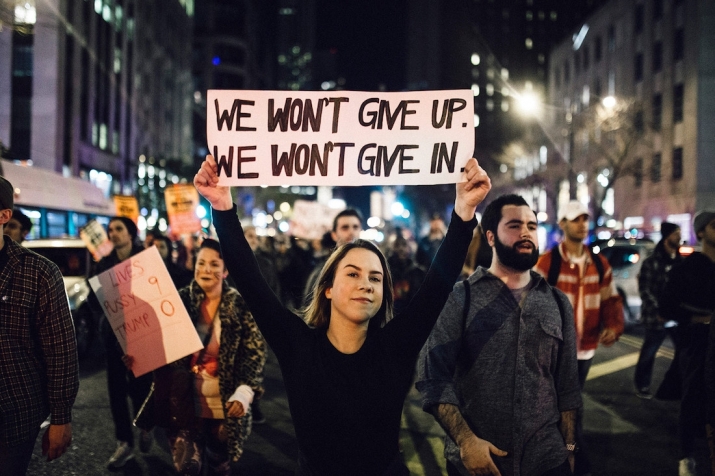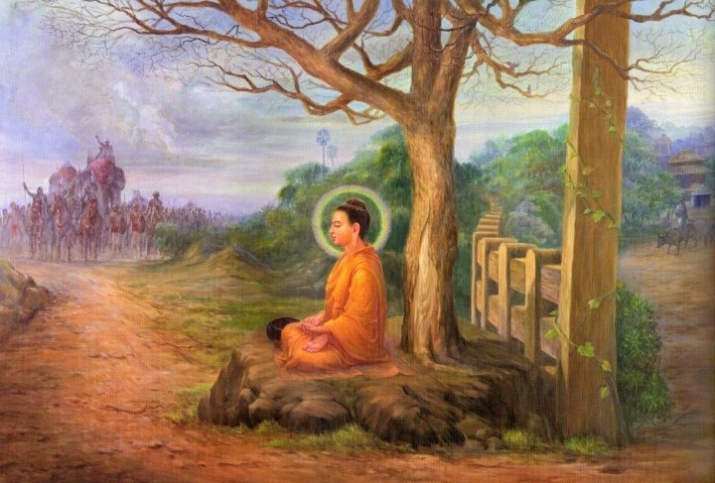FEATURES|COLUMNS|Academic Reflections
The Trump Presidency and Lessons I Refuse to Learn
 Marches for social change have erupted across the world. Photo by Jim Vondruska. From people.com
Marches for social change have erupted across the world. Photo by Jim Vondruska. From people.comAs I try to adjust to living in a world dominated by Donald Trump’s presidency and the growing realities of right-wing governments in various parts of the world, I find myself haunted by a story that takes place near the end of the Buddha’s life. The Buddha is said to have been a descendent of a proud and fiery people known as the Sakyas, who described themselves as “clansmen of the sun.”
There is a story about their demise that I find myself returning to these days. It has many versions, but it comes down to this: after a series of blunders—all of which had something to do with the Sakyas’ mistaken sense of superiority—the Kosalans had had enough and decided to launch an attack against the Sakyans.
While sitting in contemplation, the Buddha saw the events that were about to take place with his inner sight. He realized that his relatives were about to be slaughtered and, although we might expect him to play the detachment card and stay away, he decided to intervene. So the Buddha flew to the Sakya gate (yes, in this story the Buddha flies) and placed himself at the foot of a tree.
The Kosalan king arrived in full military regalia, banners waving and weapons shining, but as soon as he noticed the Buddha sitting there, he hesitated. The king had marched a great distance with an entire military expedition following his lead. He managed to make it all the way to the gate, his army fully equipped and ready to launch into battle. But the king could not walk past a sitting Buddha and so, despite the many preparations that must have led to that moment, the king of Kosala decided to retreat. After all, who can launch a massacre with a Buddha watching?
But no sooner had the king returned home than his hatred for the Sakyans was rekindled and he felt compelled to try again. A second time, the king rallied his army and charged toward the Sakya gate. A second time, the Buddha saw the situation with his magical inner eye, flew to the same spot, and blocked the army’s path. A second time, the king retreated in silence. And then a third time, the king’s hatred was rekindled. A third time, the Buddha flew to the very same tree, holding back an entire army with his seated silence.
Usually, three time’s a charm. When something happens three times in Buddhist storytelling, it is usually a sign that the situation has reached its natural end. But not here. A fourth time, the king’s hatred was rekindled. A fourth time, the Buddha saw the invasion with his inner eye. But on this fourth time, the Buddha also saw the cosmic play of cause and effect. He saw Sakyan history, their collective behavior, and the karmic fruits looming on the horizon. Karma cannot be stopped—not even by a Buddha. Our actions must meet their consequences. And so this time, the Buddha decided not to fly to the tree. He stayed behind and witnessed from afar as the Kosalan army finally invaded. According to legend, almost every single Sakyan was slaughtered as a result.
This story does not get much attention in classical sources and it receives even less in contemporary discussions. But the story lingers and never fully disappears, perhaps because it is devastating on so many levels. The community that had the honor of bringing the Buddha into the world for his last rebirth, the community that raised him and educated him and helped him get on his way, was destroyed during the Buddha’s own lifetime.
Even worse, the Buddha was there to bear witness. And he was not disinterested, nor was he practicing some version of radical non-attachment. On the contrary, the Buddha was concerned. These were his kinsmen. His family. He tried to do what he could, and all he needed to do was show up. Just that made a difference—a lesson in and of itself.
 The Buddha halts the Kosalan military expedition. From jhodymaaf.blogspot.hk
The Buddha halts the Kosalan military expedition. From jhodymaaf.blogspot.hkDonald Trump is now the president of the United States, and regardless of what we might feel about American self-importance, the fact remains that the United States plays a tremendous role on the international stage. This presidency has a global impact and we surely all feel affected to one degree or another. But what is the Buddhist response? Does it mean that, like the Buddha, we stay back and watch as karma unfolds for others? Even worse, are we to point our fingers at the US and say, “This is your collective karma coming?”
These are chilling possibilities that I simply cannot identify with. Perhaps I do not sufficiently embody the Buddhist teachings or have not progressed enough in my understanding of emptiness. I am sure that is true.
But from where I stand now, on the shifting sands of samsara with my unawakened mind, what I see is a global village in which everyone is my kin. Every place my home. I cannot do as the Buddha did in this case and refuse to fly to sit beneath the tree. I have to get up a fourth time, and a fifth time, and a sixth. I do not benefit from the Buddha’s magical capacity to read karma and so I cannot be trusted to know what is ripening or what lies ahead. And even if I did, I don’t think I have it in me to stand back and watch samsara unfold with philosophical muteness.
I am probably just going to make things worse by getting involved. The blind leading the blind. The unawakened flailing her arms in an unawakened world. But if I sit back and pretend a kind of disinterest that I do not feel, I think that would be worse.
The marches that took place around the world on 21 January tugged at my heartstrings, gave me courage, and told me that wrongs can be challenged without bloodshed, that the world can be repaired without bullets. That resistance works. Which means that, for me at least, I have to put this story aside and try not to follow in the Buddha’s footsteps. Instead, I will fly to the tree each time I see the armies approaching and sit in protest. I will teach what I understand and not what I don’t. I will watch my mind and call upon my compassion over and over again.
But I will not sit back.
To sit back is a Buddhist teaching I am simply not prepared for yet.
Related features from Buddhistdoor Global
Buddhistdoor View: Engaged Buddhism, Donald Trump, and the Way of Compassion
How Wrong Views Lead to Errors in Judgment
The US Election and the Vajjians
Buddhistdoor View: How to Be Happily Unhappy
Buddhistdoor View: Words Matter—How Harmful Speech is Poisoning Society
Related news from Buddhistdoor Global
US Buddhists Protest Donald Trump’s Travel Ban on Seven Muslim-majority Countries
Jeff Bridges Urges Donald Trump to Learn a Little Zen Philosophy from “The Dude”
Dalai Lama Offers Playful Impression of Donald Trump in TV Interview
One Earth Sangha Issues Buddhist Statement of Support for Standing Rock Protestors














